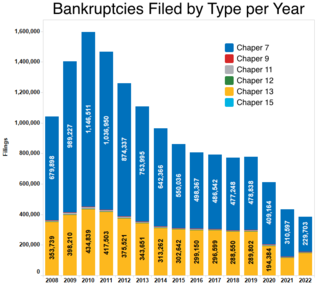Bankruptcy is a legal process through which people or other entities who cannot repay debts to creditors may seek relief from some or all of their debts. In most jurisdictions, bankruptcy is imposed by a court order, often initiated by the debtor.

Liquidation is the process in accounting by which a company is brought to an end in Canada, United Kingdom, United States, Ireland, Australia, New Zealand, Italy, and many other countries. The assets and property of the company are redistributed. Liquidation is also sometimes referred to as winding-up or dissolution, although dissolution technically refers to the last stage of liquidation. The process of liquidation also arises when customs, an authority or agency in a country responsible for collecting and safeguarding customs duties, determines the final computation or ascertainment of the duties or drawback accruing on an entry.
A creditor or lender is a party that has a claim on the services of a second party. It is a person or institution to whom money is owed. The first party, in general, has provided some property or service to the second party under the assumption that the second party will return an equivalent property and service. The second party is frequently called a debtor or borrower. The first party is called the creditor, which is the lender of property, service, or money.

In the United States, bankruptcy is largely governed by federal law, commonly referred to as the "Bankruptcy Code" ("Code"). The United States Constitution authorizes Congress to enact "uniform Laws on the subject of Bankruptcies throughout the United States". Congress has exercised this authority several times since 1801, including through adoption of the Bankruptcy Reform Act of 1978, as amended, codified in Title 11 of the United States Code and the Bankruptcy Abuse Prevention and Consumer Protection Act of 2005 (BAPCPA).
A fraudulent conveyance or fraudulent transfer is an attempt to avoid debt by transferring money to another person or company. It is generally treated as a civil cause of action that arises in debtor/creditor relations, typically brought by creditors or by bankruptcy trustees against insolvent debtors, but in some jurisdictions there is potential for criminal prosecution.
Consumer bankruptcy in Canada is governed by the Bankruptcy and Insolvency Act ("BIA"). The legislation is complemented by regulations, as well as directives from the Office of the Superintendent of Bankruptcy that provide guidelines to trustees in bankruptcy on various aspects of the BIA.

In finance, a security interest is a legal right granted by a debtor to a creditor over the debtor's property which enables the creditor to have recourse to the property if the debtor defaults in making payment or otherwise performing the secured obligations. One of the most common examples of a security interest is a mortgage: a person borrows money from the bank to buy a house, and they grant a mortgage over the house so that if they default in repaying the loan, the bank can sell the house and apply the proceeds to the outstanding loan.
An unfair preference is a legal term arising in bankruptcy law where a person or company transfers assets or pays a debt to a creditor shortly before going into bankruptcy, that payment or transfer can be set aside on the application of the liquidator or trustee in bankruptcy as an unfair preference or simply a preference.
An undervalue transaction is a transaction entered into by a company who subsequently goes into bankruptcy which the court orders be set aside, usually upon the application of a liquidator for the benefit of the debtor's creditors. This can occur where the transaction was seriously disadvantageous to the company and the company was insolvent or in immediate risk of becoming insolvent.
In company law, fraudulent trading is doing business with intent to defraud creditors.

United Kingdom insolvency law regulates companies in the United Kingdom which are unable to repay their debts. While UK bankruptcy law concerns the rules for natural persons, the term insolvency is generally used for companies formed under the Companies Act 2006. Insolvency means being unable to pay debts. Since the Cork Report of 1982, the modern policy of UK insolvency law has been to attempt to rescue a company that is in difficulty, to minimise losses and fairly distribute the burdens between the community, employees, creditors and other stakeholders that result from enterprise failure. If a company cannot be saved it is liquidated, meaning that the assets are sold off to repay creditors according to their priority. The main sources of law include the Insolvency Act 1986, the Insolvency Rules 1986, the Company Directors Disqualification Act 1986, the Employment Rights Act 1996 Part XII, the EU Insolvency Regulation, and case law. Numerous other Acts, statutory instruments and cases relating to labour, banking, property and conflicts of laws also shape the subject.

The Fraudulent Conveyances Act 1571, also known as the Statute of 13 Elizabeth, was an Act of Parliament in England, which laid the foundations for fraudulent transactions to be unwound when a person had gone insolvent or bankrupt. In the United Kingdom, the provisions contained in the 1571 Act were replaced by Part IX of the Law of Property Act 1925, which has since been replaced by Part XVI of the Insolvency Act 1986.
The collection of judgments in Virginia may be accomplished under a number of routes provided under Virginia law, depending on the amount of the judgment and the particular assets that the judgment creditor wishes to pursue.
The Parliament of Canada has exclusive jurisdiction to regulate matters relating to bankruptcy and insolvency, by virtue of Section 91(2) of the Constitution Act, 1867. It has passed the following statutes as a result:
Bankruptcy in Irish Law is a legal process, supervised by the High Court whereby the assets of a personal debtor are realised and distributed amongst his or her creditors in cases where the debtor is unable or unwilling to pay his debts.
Insolvency in South African law refers to a status of diminished legal capacity imposed by the courts on persons who are unable to pay their debts, or whose liabilities exceed their assets. The insolvent's diminished legal capacity entails deprivation of certain of his important legal capacities and rights, in the interests of protecting other persons, primarily the general body of existing creditors, but also prospective creditors. Insolvency is also of benefit to the insolvent, in that it grants him relief in certain respects.

Cayman Islands bankruptcy law is principally codified in five statutes and statutory instruments:
Alderson v Temple (1746-1779) 1 Black W 660, 96 ER 384 is a UK insolvency law case, concerning voidable transactions under what was the Fraudulent Conveyances Act 1571, and what is now the Insolvency Act 1986 section 423.
Anguillan bankruptcy law regulates the position of individuals and companies who are unable to meet their financial obligations.
The Actio Pauliana is an action in Roman law intended to protect creditors from fraudulent legal transactions, specifically transactions intended to reduce a debtor's estate by transfers to third parties in bad faith.






